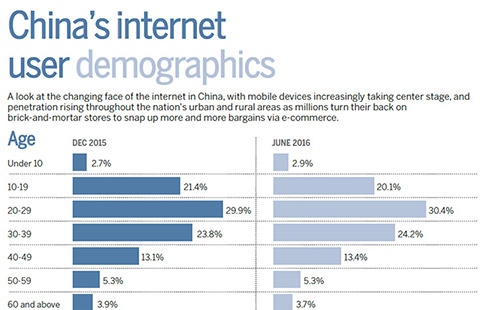The Internet and social development in China
The 3rd World Internet Conference takes place in Wuzhen, Zhejiang Province this week. At last year's conference President Xi Jinping explained that China was rolling out broadband services to even the most remote villages to assist rural development. He recognized the increasing importance of the sharing economy as well as the role of international cultural cooperation and innovation in upgrading China's economy and improving people's living standards.
This year several bold initiatives to develop the digital economy have been proposed. All of them recognize that the effective exploitation of the Internet is essential to improving labor productivity and developing the provision of modern public services. At the executive meeting of the State Council on June 24, Premier Li Keqiang said: "We may now stand at the same starting line with the developed countries in information, especially in the Internet, and even have more advantages than them in some aspects." This universal interconnectivity offers China an opportunity to overtake the rest of the world in a decisive field.
Apart from language itself, no better tool for the development of social production and universal connectivity and collaboration has been devised. However, the opportunity to positively reorganize human relations on socialist lines depends whether advances in technology, science, art and culture serve human liberation. And this is a basic criterion by which progress towards socialism can be judged.
China's method of integration with the world market and world culture has produced unprecedented achievements in human development. Indeed, its ability to adopt, assimilate and apply innovations and technologies from all over the world stimulated its extraordinary long-term growth record and brought corresponding improvements in living standards.
China is now the world's number one for Internet users. The exponential development of the Internet was based on two policies. Firstly, its basic infrastructure was developed by massive public investment and remains publicly owned. Secondly, the Chinese state limited the encroachment of international corporate Internet giants. Had China given way to the demands of the world's leading Internet companies like Facebook, Google, Amazon, Yahoo and YouTube; these companies would have distorted the use of China's Internet to serve their own interests and those of the U.S. government's National Security Agency (NSA). It was Edward Snowden who revealed that companies like Google - whose corporate motto was "Don't be evil" - were happy to sell their souls to the NSA and help them to spy on the whole world. Indeed, the NSA created the most intrusive spying apparatus the world has ever known. U.S. hegemony over cyberspace seeks to concentrate decisive influence over the Internet in its own hands and those of a few private companies.
China's scientific and technical development is guided by multiple national development plans, which are designed to form an integrated whole and facilitate innovation. However, the system has been limited by fragmented organizational structures, the duplication of effort and weak systems of oversight. To overcome this, 40 government agencies engaged in managing and resourcing science and technology plans collaborated in formulating the reforming measures to consolidate and restructure the science and technology planning system as a whole.
The demographics of Chinese society increasingly resemble the urban patterns of advanced economies; and the explosive growth of informationization means that today, even those from the most humble backgrounds can be expected to be active on the Internet. This means that in our networked society, the technical means exist to overcome many of the problems that previously hampered the information processing capabilities of planned economic systems.
The potential benefits from the application of Internet services to the social, cultural and economic life of modern China are truly mind-boggling. The Internet provides the material basis to integrate production, distribution and exchange in ways that satisfy the wants and needs of the people. It can also be used to democratize work, administration, accounting, planning, management, the protection of consumer rights, and the provision of public services. A mature and universal Internet offers the technical prerequisite for a mature form of socialism, where the benefits that stem from technology and science will be harnessed to serve the whole of humanity.
Heiko Khoo is a columnist with China.org.cn. For more information please visit:
http://www.china.org.cn/opinion/heikokhoo.htm
Opinion articles reflect the views of their authors, not necessarily those of China.org.cn.























